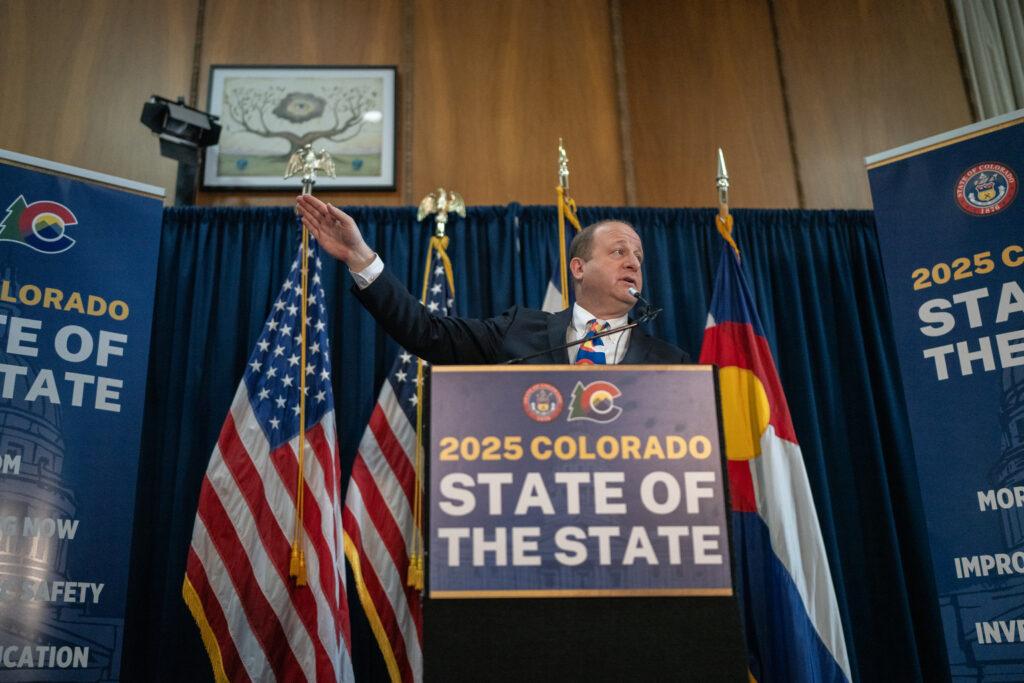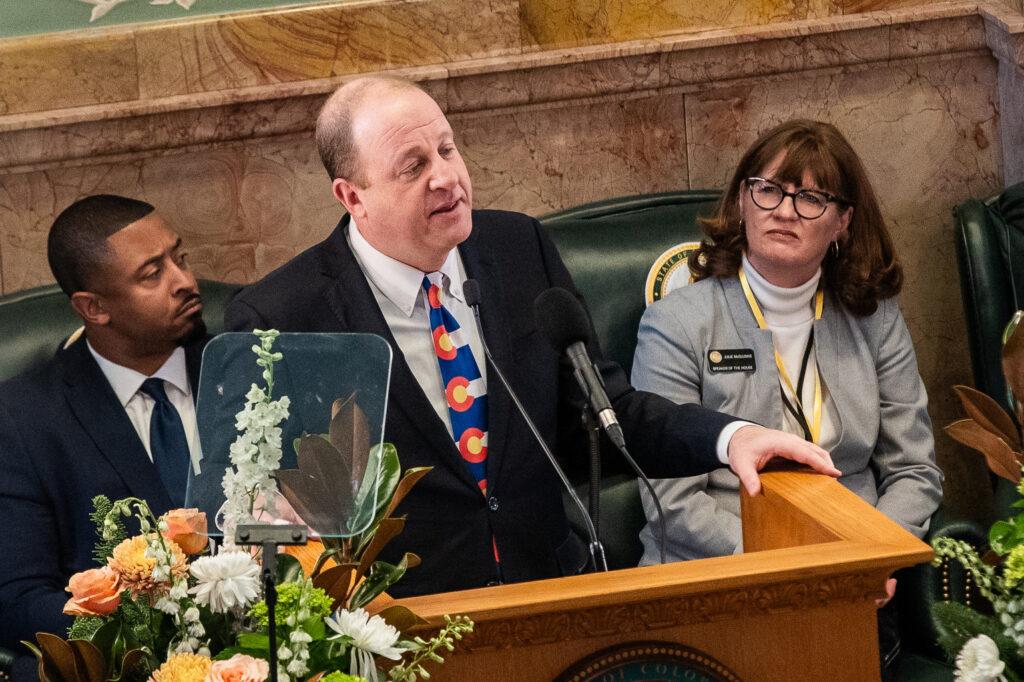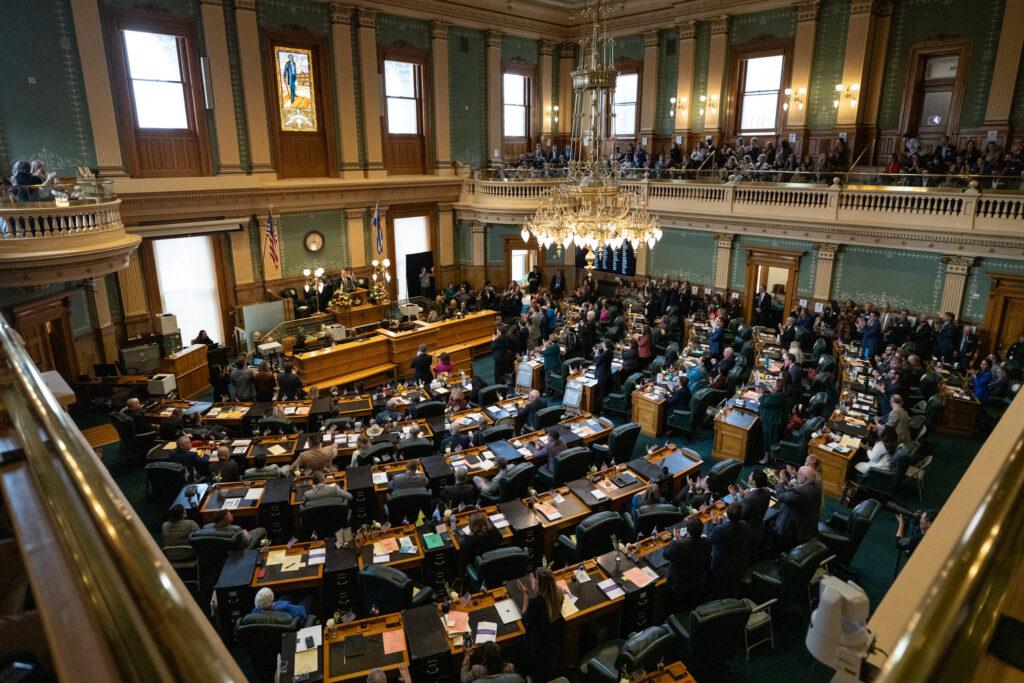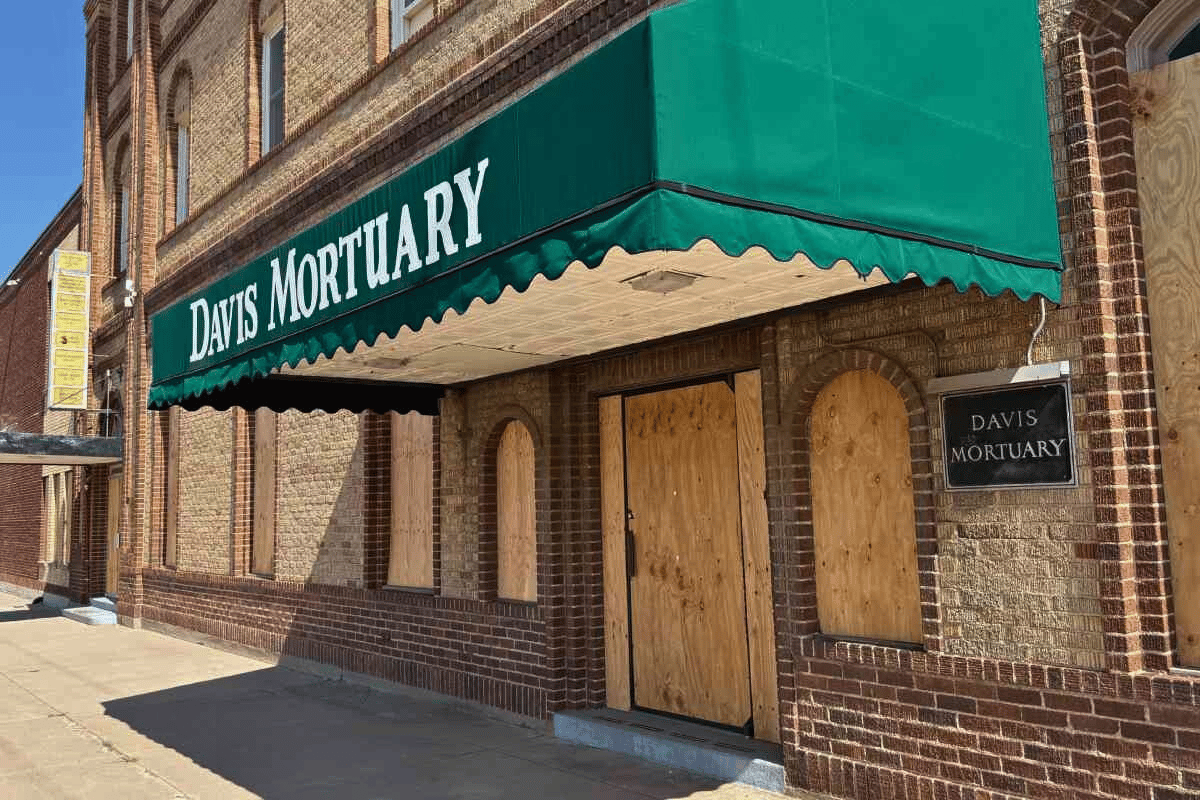
The coming year will be less about moonshots and more about implementation for Colorado Gov. Jared Polis.
During his State of the State address in the Colorado State Capitol on Thursday, the governor outlined additional strategies for affordable housing and discussed how he would and would not work with an incoming Donald Trump administration.
After the speech, he sat down with Colorado Matters host Ryan Warner to explain just how the state might lower homeowners’ insurance premiums, where the money is going to come from to close the state’s budget shortfall and where he stands on proposed deportations by the incoming Trump White House.
This interview has been edited for length and clarity.
Ryan Warner: Governor, thanks for being with us again.
Gov. Jared Polis: Pleasure to see you, Ryan.
Warner: You want to make condos easier to build. They're often starter homes. You hope to see a profusion of modular homes that are faster and cheaper to build. I was particularly curious though, about empowering nonprofits and schools to build housing. What do you mean schools?
Polis: So this is basically about the lack of what you might call ‘starter housing’ in Colorado. If you want to buy something for $200,000, $300,000, even $400,000, it's almost impossible these days in our metropolitan areas. That's the kind of housing stock we need. We're not against — and we're fine with — $600,000 homes, million-a-half-dollar homes, God bless them. But what's lacking out of artificial scarcity are these starter homes, because guess what? The person who can buy a $300,000 home today instead of leasing will build the equity, where maybe in 15 years they can buy a $600,000 home. Right?
So whether it's faith-based organizations or school districts, these are the kinds of entities that own land. Traditionally churches own land, and guess what? School districts own land and often it might be a school that closed or it might be an area that they've owned historically and they have an immediate housing need to meet for teachers and school professionals. So we want to empower them along with faith-based organizations to be part of that housing solution.
Warner: So school districts would get in the housing business, and is that to house only their own educators or could you imagine a young engineer?
Polis: So some already are, Ryan. So we're not just coming out of this out of the blue and especially in Western Colorado and some of the mountain resort areas in Pitkin County and Garfield County, school districts over the last several years have already worked on housing for their employees.
And it can work different ways, but you're right, usually, it also meets a community meet, but it could be housing, for instance, where half of the 84 units are reserved for people who work in the schools, whether it's as custodians or paraprofessionals or teachers. The other half might be market (price) or they might be affordable, but that's not for the state to plan or decide. We really put that in the hands of the school district and developers. But the key benefit there is, ‘Hey, there's a way that teachers and paraprofessionals could be part of the communities that they work in rather than forced to live further away and commute.’
Warner: And there are presumably obstacles to making sure this happens everywhere.
Polis: There's obstacles to everything in our state, Ryan. If it was easy, it would've been done already. But yes, fundamentally we want to remove some of the barriers and the difficulty around getting approval and zoning for both school districts and faith-based organizations so that they can be a bigger partner in providing the housing that we know we need, especially in high-cost communities, but frankly, across the state.
Warner: Fascinating idea to think of someone living in, say, a shuttered school that's been subdivided.
Polis: Look at the land. I mean, it may or may not work that an actual physical school could be repurposed for housing, but the land is there. So it could include demolishing the abandoned (school) and instead building condos or townhomes.
Warner: Now if someone's able to buy a home, they have to think about insurance for it, and you want to bring premiums down even as climate change drives up claims. I can't help but think of the devastation in California. Governor, how do you achieve this without handing taxpayer dollars to private insurance companies?
Polis: Your insurance, my insurance, the insurance rates across the state for homeowners insurance has gone up. Now that's largely a function of claims and risk that's gone up. And actually the biggest part of that risk profile that's increased over the last decade has been hail damage. Second biggest is fire damage.
Warner: Hail, by the way, the costliest natural disaster in Colorado.
Polis: And especially in the heavy population centers of the eastern part of the Front Range where it's had devastating impact on roofs, on cars. And part of that is simply preparing for that. Meaning, we need hail-proof roofs. And as we go into the replacement cycle for roofs, we all benefit with lower rates if there are less claims for hail damage on roofs.
Warner: Are those more expensive, hail-proof roofs?
Polis: They are, but they are accretive, what we might say, it would pay for itself and reduce insurance costs over the life of the roof. So more upfront, less over time. So what you have is kind of a financing role, if you will, of how we can make sure that more of these are built upfront because it means savings on homeowners insurance as long as we can make sure that the delta for the increased cost upfront can be funded.

Warner: So there would be a state financing project for such a thing?
Polis: That's where we're looking at developing, exactly, so that homeowners can benefit from the long-term savings and get the help upfront from hail-proof roofs.
Warner: Now, as you acknowledged in your speech, fire's trickier, though.
Polis: Yes, and we've seen an increase in fire damage both wildfires across the Front Range, Western Colorado. In my six years as governor, we've had the three largest wildfires in the history of Colorado. We've also had the most destructive fire, the Marshall Fire. The challenge there is that we need to get direct credit for the fire risk reduction or mitigation investments that we are making and are happy to make more.
What does that mean when we do community risk mitigation? That means building, let's say, a defense barrier and your community’s taking down trees. The cost of that needs to directly translate better into insurance savings. Same for homeowners themselves. If you do the work — this is more on let's say a multi-acre property in an unincorporated area — if you do the work around your home to take down bushes and trees, you should see the direct savings of that and lower homeowner insurance rates.
Warner: So is the idea there to pass some sort of law that says, ‘Hey, insurance companies, if somebody in the wildland-urban interface in Conifer clears a good amount of space around their home, there ought to be an immediate reflection of that in their premiums.’ Can you order such a thing?
Polis: That's the goal. This may very well take two sessions to complete this work, but right now we could justify additional state, fire district, HOA investments in risk reduction if there was more certainty around the premium reductions that would come out of that.
Warner: We learned this week that Colorado's unhoused population grew in 2024. The federal point-in-time count tallied about 4,000 more people on the streets here than in 2023. Governor cities from Grand Junction to Denver have taken aggressive approaches to this issue. Shelters. Micro housing. Enforcement. And yet, we seem to lose ground. Is your talk on housing stronger than the results you're producing?
Polis: Well, first of all, yes, there's a direct connection between the cost of housing and homelessness, and you can look at a very simple graph. In cities that have high housing costs, have higher homeless. Cities that have low up housing costs have a lower homelessness rate. Now, again, I'm not here to argue that by any means, housing costs are the only cause of homelessness. There's many behavioral health and drug addiction issues that contribute, but the cost of housing alone is a major determinant. So our work on that has begun and we need to continue to deliver on more affordable condos housing that people can afford.
In addition, as you mentioned, many different cities in our state, Colorado Springs, Grand Junction, Denver: all dealing with homelessness in different ways. Our strategy as a state has been, ‘How can we be a partner? We're not going to tell you your strategy, but we will work with you to reduce homelessness.’
Warner: But you're perfectly happy to have the state lead, for instance, on issues of zoning and housing and not necessarily have cities self-determined in that regard. But in homelessness, you say it's the city's responsibility. Why?
Polis: If there's interest in the state taking this on, we'd be happy. We don't have any authority at all for this now. But, I mean, if the mayors came to us and said, ‘We want the state to do this,’ I'd certainly be open to that. But as the laws are now written, I have zero authority to be able to go into a city and move people for squatting or anything like that.
Warner: I spoke with Senate Minority Leader Paul Lundeen, (R-Monument), just after your speech, and y'all are singing a similar tune about saving Coloradans money, but his prescription is to eliminate fees and he notes recent ones, like a 10-cent fee on plastic bags. There are fees associated with meal delivery. Does Senator Lundeen have a point about some of these new arrivals in Fee Land?
Polis: Well, whether a fee is new, old, we certainly ought to evaluate whether we need it. I mean, we've reduced, for instance, the cost of a park pass. We've reduced vehicle registration fees. So, I mean, I'm excited to reduce any fee. It's always a fiscal question. Then where does the money come from? Is there something we no longer need to do? But certainly, we should look at cost to consumers.
Warner: What do you think of that bag fee, for instance?
Polis: Look, the world is moving away from single-use bags, and I think keeping them available is important to people — and this is the way it is in many cities and states — and it can be inconvenient to have to pay to get a bag. But I think more people are reusing bags when they shop. Again, I'm open to any discussion. I mean, if the goal is saving people money, it's a discussion that we're happy to have.

Warner: I want to talk about the budget, which for the first time in a while does not look terribly rosy. In a letter to the legislature you wrote, ‘Colorado will face budget pressures in the immediate future and likely in the years to come.’ Are we entering an age of austerity?
Polis: This is a complicated analysis for Colorado because we have a very large budget surplus. That means every Coloradoan is going to be getting a check back. Exactly how much depends on how much you paid. But Coloradans are going to get hundreds of dollars back because we receive more money than we are allowed to spend under the Taxpayer’s Bill of Rights.
Warner: I was going to say TABOR is the elephant in the room here.
Polis: The limit on expenditures is tied to inflation plus population growth. So to make it as simple as possible, what happened, which is very good for everybody in the world, is inflation came way down. That's great news, right? Inflation was 4, 5%. I think it's now in our projection 2.6 or 2.5%. That means rather than increasing at 4% or 5%, the state budget increases at 2.6%. Plus there's an adjustment for the population, which is still increasing, but it's not a large one, and that's the reason that these increases of the past few years with inflation can no longer occur in this environment.
So as a Coloradan, as an American, I certainly hope that low inflation is here to stay because that decreases cost for Coloradans borrowing a mortgage or a car. But yes, that also puts additional pressures on the budget to grow at a slower rate.
Warner: I've sat across the table from many different governors who call for some sort of change to TABOR that would make this equation different. Are you one of them?
Polis: I've been happy with the progress we've made. Primarily when I came in, my goal was to reduce the income tax. We were excited to reduce the sales tax. We got that built in. So Colorado has the lowest income tax down in recent history. When I was elected, everybody paid 4.63% income tax. Voters approved reducing it to 4.5%. I supported that. (Then down to) 4.4% in another election, (I) supported that — working with the legislature to prevent this large surplus that we can't even spend. We now reduced the income tax to 4.25%. We also created a mechanism to reduce the sales tax when there's a large TABOR surplus. So these are ways of reducing cost to everyday Coloradans so that we benefit from lower costs as a result of the surplus.
Warner: Do you still want to eliminate entirely the state income tax?
Polis: I'd love to. That's aspirational. I've always talked about that. I'm very proud of the progress we've made. Again, I highlighted it. Started at 4.63%. Now it's 4.25%. That's a significant cut. Always happy to work on more. Aspirationally, I've made it clear I'm not a particular fan of that tax because it's a tax on productivity. I would look at other alternatives, but again, I'm proud of the progress we've made.

Warner: President-elect Trump vows to deport people from Aurora and beyond. And you said in your speech ‘We don't support efforts to deport American citizens to target those on pending legal status, to break up families, to create orphans of American children whose parents are alive and who come to this country to build a better life for their families.’
You also mentioned a DACA recipient whom you called Sofia, who is worried about her status. Governor, if federal officials ask you for Sofia's real name and where she lives, what are you going to do?
Polis: Well, she's a DACA recipient, which means she's registered with the federal government. I don't have her address. Obviously, I have her phone number. But all the DACA recipients — which is why they are in fear right now, this is the Dreamers, if you will — are people that registered to get provisional work permits through DACA, which is administrative, not statutory at the federal level.
Look, we look forward to increased resources from the federal government, whether it's the FBI or ICE to apprehend criminals. And again, I make no distinction. If a criminal was born in America or if they're an immigrant, we want dangerous criminals detained, apprehended. If they're Americans, we'll put them in our prisons. If they are here illegally, it's a federal government's responsibility to deport them. And we welcome that help. That's all part of making Colorado safer. But at the same time, there's so many law-abiding immigrants following our state laws.
Sofia works as a nurse in a hospital providing life-giving care. Many other immigrants work in the agriculture sector, hospitality, service, industrial. And if there were some sort of deportation program that got rid of people that are important parts of our community it would drive grocery prices up and housing prices up. And if you know my North Star, Ryan, I think you started with this, it's how do we deliver less costly housing, less costly groceries? And this is the opposite of that.
Warner: But if deportations are broader, what power do you have?
Polis: Well, first of all, as you know, immigration is the purview of the federal government, and there is no legal impediment to the work that the federal government does in any state, including Colorado. At the same time, we want to make sure that to the extent that people are following our state laws, that they are welcome here. And that's what we do. Everything in our power to do that.
Warner: What is in your power though, and that's what I'm asking.
Polis: Well, we have strong laws as an example, that we won't share immigration status on non-criminal cases with the federal government, nor should we. We're happy to cooperate on any criminal matter, but if the federal government wants to enforce immigration laws, that should be on their dime, not on our dime.

Warner: What if the federal government starts to tie federal funding to your cooperation?
Polis: Well, now you're dealing with hypotheticals. I don't know what the future will have. I mean, when I became governor, Donald Trump was also president of the United States, and obviously, we worked through this and at the same time, look forward to increased cooperation with the federal government to apprehend criminals. We also hope that Congress takes up permanent legal status for Dreamers and others that are an important part of Colorado, but also an important part of America, especially in agriculture and service, in construction and in many other sectors.
Warner: Maybe it's a hypothetical. I mean, members of the congressional delegation, the new congressional delegation, which is now more Republican, are already talking about this.
Polis: Yeah, I mean, let's see what Congress does, right? I mean, I'm sure I'll be happy to opine if there's a bill and you can come talk to me. I'll tell you what I like, what I don't like, but I don't know what that is yet. I did support the bipartisan border security bill that I wish had made it through last session. That wasn't a complete fix, but it would've helped. And I'm for border security and I'm sure that'll be a part of whatever moves forward. But I also hope that some kind of status for Dreamers and others who are an important part of Colorado is also part of any legislative efforts.
Warner: Nationally, the murder rate is falling precipitously from pandemic highs, but it seems Colorado's is mostly flat. That's according to the real-time crime index. The police chief in Pueblo told our justice reporter, Allison Sherry, that it's due to the legislature's soft-on-crime approach. You've said you want to make Colorado the safest state in the nation. Is Colorado's murder rate being flat, something of a failure in this regard?
Polis: Well, I did cite our homicide rate is down 9% and that particular offense is not a criminal issue. I mean, you go to jail generally for life or for many decades for homicide or murder. I would stack our penalties up against any other state in that regard. But certainly, we look forward to working with local jurisdictions around making sure we have tough criminal penalties in place for many other property crimes.
I called for two specific additional penalties in my State of the State. One is for stolen guns – and we had a similar issue with regard to automobile theft. We had one penalty if the car was worth more than $2,000 and another penalty if it was worth less. We also have a dollar threshold for guns. I think any stolen gun is dangerous — can be used in a crime. Actually, the majority of crimes committed with guns are done with stolen weapons. So we need to get serious about that. I also called for additional penalties around wildlife trafficking. I'm open to additional penalties if there's areas where looking at the data and looking at other states, we can make sure that we can have the right punishment to fit the crime and prevent the likelihood of recommitting a crime when the term is served.
Warner: Members of the legislature from rural communities seemed overjoyed that you brought up the concept of livestock theft. You have said elsewhere that these crimes are sophisticated and inter-jurisdictional to some extent. It almost sounds like trafficking to me.
Polis: It is. Cattle rustling is, again, something you might call a sophisticated crime. It's not somebody who just steals calves and they're in a nearby field. I mean, if that occurs, that would be called sort of a dispute between neighbors. Generally, it's our belief that they're out of county and often out of state within a matter of days. So this is a matter of increased intelligence, surveillance, working to bust interstate crime rings because moving hundreds of cattle is a significant operation — a significant criminal enterprise — and one that we want to make sure that we combat. And I've really pulled together our Department of Public Safety, our Department of Agriculture, to provide direct assistance to county sheriffs, brand inspectors that are the lead on the ground on these investigations.
Warner: The legislature will consider another assault weapons ban. Senate Bill 3 would affect things like AR-15-style rifles, but also semi-automatic handguns. Are there restrictions on these weapons that you could support? There's a history here.
Polis: Yeah, I mean, I'll certainly take a look at any bill. I specifically, on gun safety, have called for stronger penalties for stolen guns because as I said, stolen guns — and this is regardless of the type, they could be a pistol, they could be semi-automatic, they could be a rifle — they're far more likely to be used in crimes. If there's additional measures that can improve safety, help us become one of the 10 safest states, at the same time, respecting our Second Amendment rights, respecting the fact that many Coloradans use guns for sport hunting, for home safety, we're happy to have that conversation.
Warner: But you're not immediately sold on the idea.
Polis: Well, I am sure they'll have many other ideas. Again, what I called for is tougher penalties around stolen guns. I'm sure there's a number of other ideas people have on gun safety and we're happy to hear them out.

Warner: Voters ordered the legislature to set aside $350 million for law enforcement. But Proposition 130 came with no timeline, no real deadline. You're asking to do it all at once this year. And backfill later. Legislative leaders told our Bente Birkeland, they favor a phased in approach. Is your tack prudent?
Polis: Well, I don't think that characterization is exactly accurate. The initiative requires that a fund be established with $350 million for these purposes. And that includes support for local law enforcement and also survivor benefits for the spouses or family of people who are lost in the line of duty.
What it is silent on is how long the period of time is where the fund is spent down. And I think we are on a very similar page with the legislature in that this is likely to be five years, six years. That is consistent with the intent of the proponents of the ballot initiative. It's fiscally prudent. It wouldn't be prudent to spend it in two years. That would create a huge law enforcement funding cliff in two years. That would be disastrous for law enforcement. And at the same time, we want it to be a material increase to law enforcement. And if you did it over 10 or 12 years, it wouldn't be as noticeable consistent with the intent of the ballot initiative where people would actually see the benefit of improved public safety from the improvements in law enforcement hiring and retention.
Warner: And so in that way, what does that break down to? I'm trying to do math on the fly, which is always incredibly dangerous for me. But what, $60 million a year?
Polis: I guess it could be 40, 50, $60 million a year. Remember that we also have to fund the survivor benefits out of that $350 million, that same fund. So we want to fund this.
Warner: And you want to do that right away, by the way?
Polis: Well, in perpetuity. Right? So you need $50 to $100 million that you effectively don't spend. Because some years, it's one (death of an officer), some years it's three, some years it's four, but it can fund the survivor benefits of $1 million to the surviving families of law enforcement. So you set that aside. The rest of the money gets formulaically distributed per the voter intent and per the initiative to local law enforcement, police and sheriff's departments over a period of five or six years.
Warner: What kind of squeeze does this put on your other aspirations?
Polis: It really doesn't. I happened to vote for it myself as an individual. And obviously, the majority of Coloradans joined me. We are proposing doing this effectively from reserve funds, which would then be paid back over the duration of this fund, which again, five years, six years, seven years, whatever it is.
Warner: Legislative Democrats, again seem interested in bills regarding wage theft as well as making it easier to unionize. You've been skeptical in the past, vetoed a wage theft bill last year. Today you mentioned that any changes to the state's Labor Peace Act, which has to do with organizing, would require the backing of labor and business. Does that mean the business community essentially has a proxy veto over any changes to this act?
Polis: Well, no more than labor does. This has created peace and stability in this sector for 81 years. Meaning workers know how they can vote to form a union. It requires a simple majority vote. If they want to then negotiate for an automatic dues deduction, even from workers that don't want to be union members, it requires a second election.
So the importance is the predictability for workers for businesses about the rules, about how you can vote to form a union, how you can then vote to negotiate on what you might call ‘closed shop’, required union fees, deductions, in a way that's stable over time. And to have that stability, you need to have labor and business as part of it. Either side has the ability to run things at the ballot to create instability to blow things up. This has endured for 81 years. I hope that if we create a new compromise if there is one that the business and unions agree on, that's better than the prior one. It needs to stand the test of time for decades to come.
Warner: Governor, thanks so much for your time.
Polis: Thank you, Ryan.









